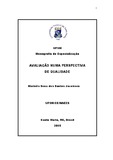| dc.contributor.advisor | Melo, Regina Maria | |
| dc.creator | Jacobsen, Marinês Sena dos Santos | |
| dc.date.accessioned | 2016-10-03T14:57:02Z | |
| dc.date.available | 2016-10-03T14:57:02Z | |
| dc.date.issued | 2005-03-22 | |
| dc.date.submitted | 2005 | |
| dc.identifier.uri | http://repositorio.ufsm.br/handle/1/2208 | |
| dc.description | Monografia (especialização) - Universidade Federal de Santa Maria, Centro de Educação, Curso de Especialização em Educação, RS, 2005. | por |
| dc.description.abstract | This work presents an exposition regarding the evaluation in a quality
perspective, theme what has been generating controversies and divide the
professionals in education on which the best method of evaluate. Thus, we
have the literature revision, so that one can give a better sightof the work
and to facilitate its understanding on the part of the reader; interviews
accomplished with teachers at the Municipal School of Fundamental
Teaching, because the one that one hopes is that the process of stops
being a mere classificatory instrument, as well as the factor that
contemplates in the high drop out rates and failing. Thus, the students and
teachers must understand it as an instrument of understanding of the
learning process of the learning. For the accomplisment of this work the
case study was used, for the fact of this to allow a deep analysis, to allow
the crossing of several sources of information, confirming or rejecting
hypotheses to know to what extent the evaluation can influence in the
students’ result end although it is recognized that there is an abyss
between the theory and practice, that ends up contributing to the social
exclusion. What is waited they are practical solutions based on the
dialogue and in the students’ active participation, teachers and, mainly, of
the community where the school is inserted; that the rigid and structured
outlines are substituted by other lighter, open, dynamic and flexible; and
that the evaluation really seeks to promote the student, qualifying him to
act and interact as a Brazilian citizen aware of its acts. In an attempt of
giving wide vision of the subject, it start from beginning that the reader will
enjoy this tacit knowledge to do the generalizations and to develop new
ideas, new meanings, new understandings. | eng |
| dc.language | por | por |
| dc.publisher | Universidade Federal de Santa Maria | por |
| dc.rights | Acesso Aberto | por |
| dc.subject | Psicopedagogia | por |
| dc.subject | Educação | por |
| dc.subject | Avaliação educacional | por |
| dc.title | Avaliação numa perspectiva de qualidade | por |
| dc.title.alternative | Evaluation in a perspective of quality | eng |
| dc.type | Trabalho de Conclusão de Curso de Especialização | por |
| dc.degree.local | Santa Maria, RS, Brasil. | por |
| dc.degree.specialization | Educação | por |
| dc.description.resumo | Este trabalho apresenta uma exposição a respeito da avaliação
numa perspectiva de qualidade, tema que tem gerado controvérsias e
divide os profissionais em educação sobre qual o melhor método de
avaliar. Assim, temos a revisão de literatura, a fim de que se possa dar
um melhor embasamento ao trabalho e facilitar a sua compreensão por
parte do leitor; entrevistas realizadas com professoras regentes da Escola
Municipal de Ensino Fundamental, pois o que se espera é que a avaliação
deixe de ser um mero instrumento classificatório, como também o fator
que reflete nos altos índices de evasão e reprovação. Assim, os alunos e
professores devem entendê-la como um instrumento de compreensão do
estágio de aprendizagem em que se encontra o aluno. Para a realização
deste trabalho foi empregado o estudo de caso, pelo fato deste permitir
uma análise profunda, permitir o cruzamento de várias fontes de
informação, confirmando ou rejeitando hipóteses para saber até que
ponto a avaliação pode influenciar no resultado final do aluno embora se
reconheça que há um abismo entre a teoria e prática, que acaba
contribuindo para a exclusão social. O que se espera são soluções
práticas baseadas no diálogo e na participação ativa dos alunos,
professores e, principalmente, da comunidade onde a escola está
inserida; que os esquemas rígidos e estruturados sejam substituídos por
outros mais leves, abertos, dinâmicos e flexíveis; e que a avaliação
realmente vise promover o aluno, capacitando-o para agir e interagir como
um cidadão brasileiro consciente de seus atos. Numa tentativa de dar
ampla visão do assunto, partiu-se do princípio de que o leitor desfrutará
deste conhecimento tácito para fazer as generalizações e desenvolver
novas idéias, novos significados, novas compreensões. | por |
| dc.publisher.unidade | Centro de Educação | por |


